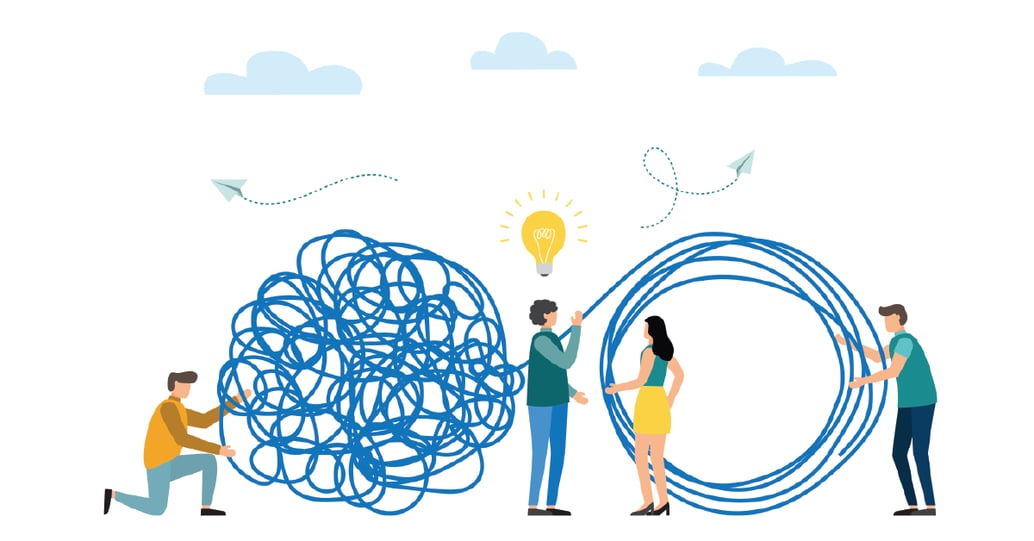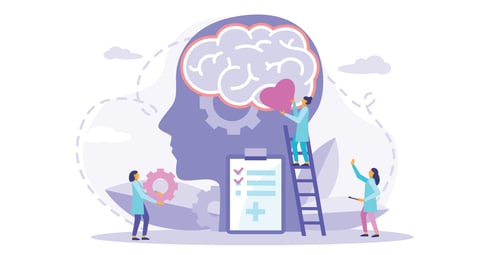October 10th marks World Mental Health Day where we are called to raise awareness of mental health and take more action toward supporting those who live with mental health challenges. This year’s campaign slogan is make mental health & well-being for all a global priority. As a global digital health company, we have seen the negative impact of poor mental health on overall employee health and well-being, as gathered through our various assessments, as well as how the last few years have brought significant changes to the ways mental health is supported in the workplace.
Like other health conditions, risk factors for mental health are complex, implicating genetics and the environment. Further, mental health is intertwined with other dimensions of health, such as physical health. For example, mental health is bidirectionally associated with cardiovascular disease. With overlapping risk factors, it just makes sense to address mental health as part of a holistic approach to improving population health and well-being, such as in workplace health and wellness programs.
The following are three reasons why World Mental Health Day 2022 matters in workplace well-being.
Employees Need Mental Health and Well-being Programs Now More than Ever
The prevalence of mental disorders has increased, with trends predicting it will cost the global economy $16 trillion USD by 2030. Within the workplace, the importance of mental health had been growing for years as the direct and indirect costs of poor mental health continued to increase exponentially. It became front and center during the COVID-19 pandemic when routines were disrupted, loneliness and isolation increased, and/or loved ones fell ill. Today, mental health has become one of – if not the most – prominent feature of workplace health and wellness programs.
Measures of resilience, stress, and diagnostic screening for mental illness are some of the components that employers use to assess and subsequently establish targeted solutions for their team members, from virtual therapy to adopting more flexible workplace policies. However, unlike physical activity where one solution suits many, this is definitely not the case for mental health support. A great deal of personalization is needed to ensure individuals get the support they need.
However, mental health is typically left unaddressed unless it is considered ‘serious enough’ - whether that be when an individual’s symptoms reach a certain level of severity or when the concerns reach a certain level of prevalence in the population. The delicate nature of mental health also means that employers fear that knowing certain information may require them to take action they are not equipped to take. Obviously, steps should not be taken if they risk doing more harm than good, but employees at-risk are in need of support now.
Mental Health Support is Challenged by StigmaImportantly, the ways in which mental health is approached and help is sought are vastly different across cultures, ages, genders, and among other sociodemographic variables. For example, younger employees are more likely to feel comfortable talking about their mental health, though younger men are more likely to fear retaliation. Navigating mental health requires sensitivity to equity, diversity, and inclusion – individual characteristics are essential considerations in order to provide the most appropriate care possible.
Unfortunately, many individuals with mental health concerns face stigmatization, which in this case is a form of prejudice or discrimination based on their mental health that can occur within oneself, among other people, and at structural levels. In the workplace, approximately 50% of employees are concerned about discussing their mental health challenges, while more than one in three are concerned that they will experience retaliation or be fired for seeking mental health support. Not only are these numbers staggering, they point to the fact that individuals who fear stigmatization will be less likely to seek support.
In North America, employees are not required to disclose their mental illness, but they may have to share details if they are requesting accommodation. This ultimately puts individuals in a situation where they need to decide if they will disclose aspects of their condition in order to attain accommodation, regardless of whether the organization is truly able to meet their needs. With fear of stigmatization, many individuals remain silent and unsupported, which can lead to even more serious mental health concerns.
Employers Can Make a Real Difference with Employee Mental HealthThere are various approaches employers can take to support mental health in the workplace, from employee assistance programs (EAPs) to culture shifts and management training to detect symptoms of poor mental health. These resources, along with peer support, can go a long way. However, people cannot use workplace resources if they are unaware of them.
What if mental health resources were so readily available and strong that individuals did not have to go to Management or Human Resources when they needed support? Not only would this result in getting help faster, without having to wait for responses from their colleagues, but it would also bypass the need for Management or HR entirely, who may also have their own mental health concerns. Most importantly, however, it does not require employees to disclose their mental health concerns if they do not want to or fear how others will respond to them.
The takeaway is this: organizations should be equipped with the tools to evaluate, raise awareness, and support mental health so that individuals can appraise where they are at and do not have to disclose their mental health concerns or conditions in order to access help. Clear documentation on available accommodations, workplace health and wellness programming, EAPs, and workplace policies should be widely available and easy to access at any time, regardless of the work one does or where they are located. All employees should be informed about what their workplace offers as soon as they are hired and should be reminded on a regular basis to ensure those who need support can get it. Employers should also assess themselves – upholding a positive business culture where mental health is not stigmatized and people feel equipped to help themselves or others is paramount.
Mental health and well-being is, and always should be, a priority. On World Mental Health Day 2022, we encourage all employers to reflect on resources they have today so they can provide better support in the future.

About The Author
Sammy Chown
Sammy Chown is the Public Health Researcher at Carebook Technologies. Completing her MSc in Public Health and Health Systems, she has a passion for improving the health of populations across the lifespan, especially as it relates to mental health and accessibility.



